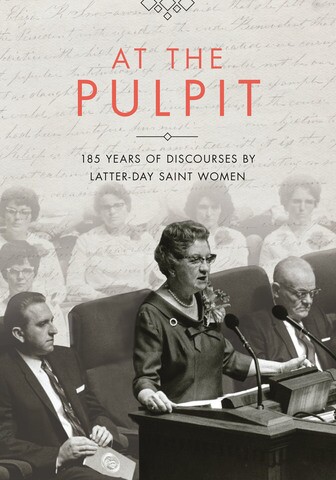Emma Hale Smith was an educated woman—a strong leader and public speaker. As the first president of the Relief Society, her words, recorded in Relief Society meeting minutes, continue to inspire and encourage us to increase our faith and charity. Learn more in At the Pulpit: 185 Years of Discourses by Latter-day Saint Women.
In early July 1830, a short time after Emma Smith’s baptism, Joseph Smith dictated a revelation directed to his wife, now known as section 25 of the Doctrine and Covenants. The revelation addressed Emma Smith as “an Elect Lady whom I have called” and told her that she would be “ordained . . . to expound scriptures and exhort the church according as it shall be given thee.” Her calling extended even further when she was elected president of the Female Relief Society of Nauvoo on March 17, 1842.
At the first meeting of the organization, Joseph Smith read the 1830 revelation, explaining that at the time it had been given, “Presidentess” Smith had been “ordained . . . to expound the scriptures to all; and to teach the female part of the community.” He went on to liken Emma Smith to the “Elect Lady” spoken of in the New Testament. John Taylor called Emma a “mother in Israel,” and instructed her to care for the needy and be a “pattern of virtue,” to “preside and dignify her office” through teaching correct principles.
► You'll also like: Lucy Mack Smith's Faith-Filled Speech That Parted the Ice on the Erie Canal
Though Emma Smith met with the society only 12 times in 1842 and four times in March 1844, her leadership was crucial in shaping the organization. Her public speaking established a pattern for Latter-day Saint women, who looked to the 1830 revelation—which declared that its exhortation to Emma was also the Lord’s “voice unto all”—as justification for their own ministries.
While the Nauvoo Relief Society functioned in a discussion format rather than as a venue for traditional discourses, Emma Smith’s words, which are excerpted here, show her leadership. Even at the final meeting of the Nauvoo Relief Society, Smith maintained her sense of spiritual authority, exhorting the women to repent as they strengthened each other and practiced charity.
[March 17, 1842]
PRESIDENT EMMA SMITH remarked we are going to do something extraordinary. When a boat is stuck on the rapids with a multitude of Mormons on board we shall consider that a loud call for relief. We expect extraordinary occasions and pressing calls. . . .
President E. Smith then arose and proceeded to make appropriate remarks on the object of the society, its duties to others, also its relative duties to each other, viz., to seek out and relieve the distressed, that each member should be ambitious to do good, that the members should deal frankly with each other, to watch over the morals and be very careful of the character and reputation of the members of the institution, etc. . . .
[March 24, 1842]
President E. Smith then rose and said that measures to promote union in this society must be carefully attended to. That every member should be held in full fellowship. As a society, hoped they would divest themselves of every jealousy and evil feeling toward each other if any such existed. That we should bring our conduct into respectability, here and everywhere else. Said she rejoiced in the prospect before her. . . .
President E. Smith said, no one need feel delicate in reference to inquiries about this society. There is nothing private. Its objects are purely benevolent . . . , its objects are charitable: none can object to telling the good, the evil withhold. She hoped all would feel themselves bound to observe this rule. . . . She said it was the duty of every person to inquire into the condition of the poor and represent their true state. . . . We should assist each other in this way. . . .
► You'll also like: What You Didn't Know About Emma Smith
[April 14, 1842]
President E. Smith arose and addressed the meeting. . . . Her desire was to do good. Wished all the members of this society to assist her. Said it was necessary to begin at home, to eradicate all evil from our own hearts, and warn those who wish to join with us to come calculating to divest themselves of everything wrong and unite to expose iniquity, to search it out and put it away. She said the society had other duties to attend to than seeing to the wants of the poor. Exhorted the members so to conduct as to have the honor of commencing a good work and of carrying it out. Enforced the necessity of walking in a manner that would be approbated of God. . . .
President Smith then called on those, if any present, who knew of cases of the poor to be represented.
[August 4, 1842]
Mrs. President arose and addressed the society upon the necessity of being united among ourselves. Said we shall have sufficient difficulty from abroad without stirring up strife among ourselves and hardness and evil feelings one towards another, etc. . . .
We could govern this generation in one way if not another. If not by the mighty arm of power, we can do it by faith and prayer. If we will try to live uprightly, said she believed we should not be driven.
Mrs. President continued by saying God knows we have a work to do in this place. We have got to watch and pray and be careful not to excite feelings, not make enemies of one another, etc.
[March 16, 1844]
Mrs. President then arose and addressed the meeting upon the necessity of being united among ourselves and strengthening each others hands in order that we may be able to do much good among the poor. . . . We must throw the mantle of charity around to shield those who will repent and do so no more. . . . She advised all to abide the Book of Mormon and Doctrine and Covenants. . . . Also exhorted them to look after the poor.
Nauvoo Relief Society Minute Book, Mar. 17, 1842–Mar. 16, 1844, 8–[126], in Jill Mulvay Derr, Carol Cornwall Madsen, Kate Holbrook, and Matthew J. Grow, eds., The First Fifty Years of Relief Society: Key Documents in Latter-day Saint Women’s History(Salt Lake City: Church Historian’s Press, 2016), 32–130. Handwriting of Eliza R. Snow and Hannah M. Ells.
At the Pulpit: 185 Years of Discourses by Latter-day Saint Women
Written to the high scholarly standards of the Church Historian's Press, the book provides a resource for contemporary Latter-day Saints as they study, speak, teach, and lead. The voices in these pages ring from Nauvoo's red brick store to the National Auditorium in Mexico City to the Tabernacle on Temple Square and beyond. These discourses offer instruction on gospel principles while also revealing the particular concerns of individual women. At the Pulpit allows us to hear the historical and contemporary voices of Latter-day Saint women—voices that resound with experience, wisdom, and authority.
Editor's note: This article originally ran on LDSLiving.com in March 2017.



